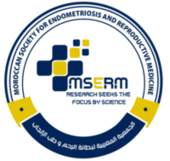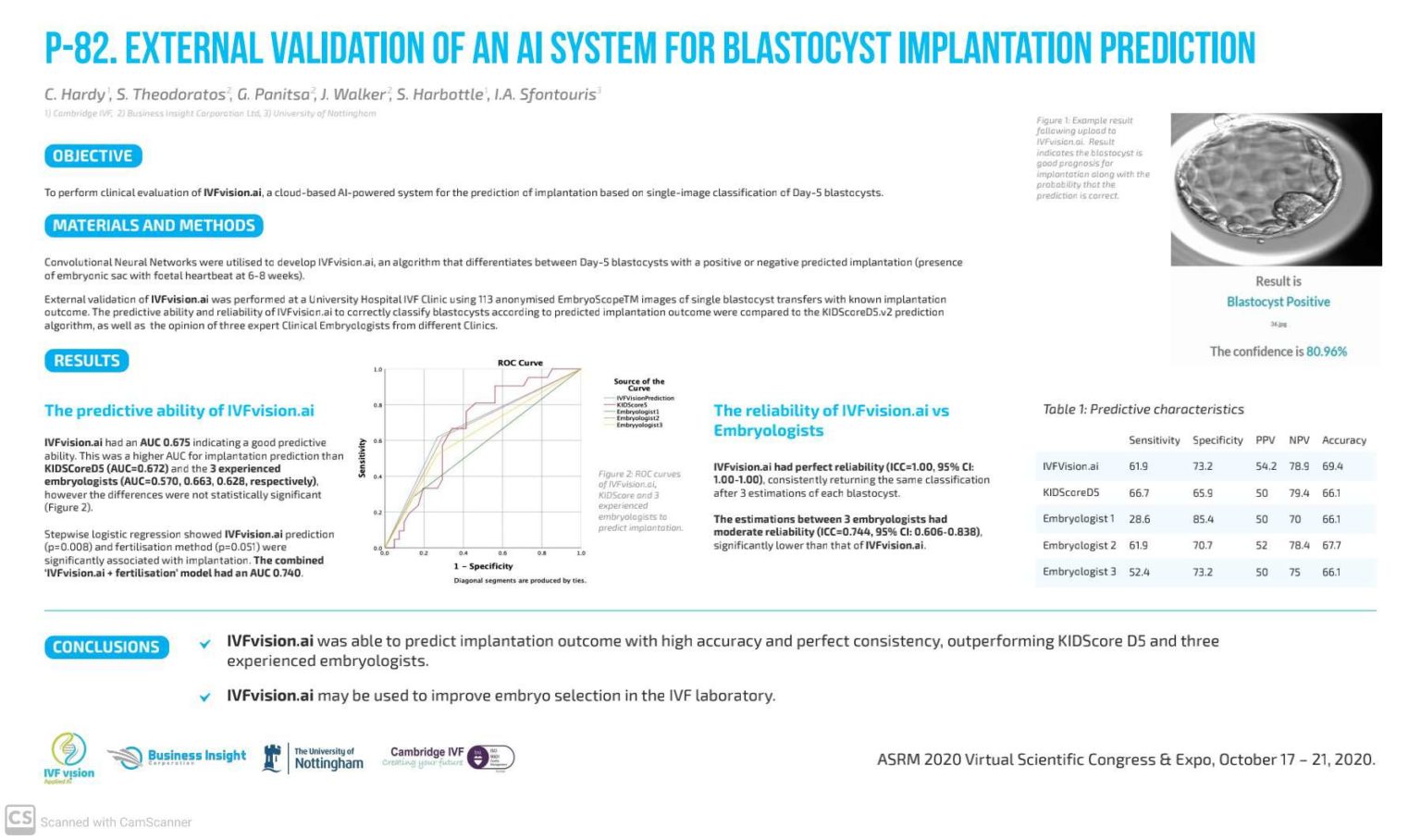Track: ART – LAB, Assisted Reproductive Technology
Poster : ART Lab: Technology
Chloe Hardy
Clinical Embryologist
Cambridge IVF
Cambridge, United Kingdom
Objective: To assess the performance in a clinical setting of IVFvision.ai, an artificial intelligence (AI) system for blastocyst selection DESIGN: Retrospective analysis of single blastocyst transfer (SBT) images MATERIALS AND
Methods: Convolutional Neural Networks were used to develop IVFvision.ai, an algorithm that differentiates between Day-5 blastocysts with a positive or negative implantation outcome. Implantation was confirmed by the presence of an embryonic sac with heartbeat. External validation of IVFvision.ai was performed at a University IVF Clinic using 113 anonymised Embryoscope images of SBT. Assessed images were taken at 116±h hours post-insemination at the equatorial focal plane. The predictive ability and reliability of IVFvision.ai to correctly classify blastocysts according to implantation outcome were compared to the KIDScoreD5 v2 prediction algorithm, as well as three expert Clinical Embryologists. AUC for each predictor was estimated using ROC curve analysis. Sensitivity, specificity, PPV, NPV and accuracy were calculated using crosstabs. Reliability of IVFvision.ai and embryologist assessments was calculated by the Interclass correlation coefficient (ICC). Stepwise logistic regression was used to model predictors significantly associated with implantation controlling for maternal age and fertilisation method.
Results: IVFvision.ai had higher AUC and overall accuracy in predicting implantation compared to KIDScoreD5 and all embryologists (Table 1). The reliability of IVFvision.ai was perfect (ICC = 1.00, 95% CI 1.00 to 1.00), consistently returning the same classification after a triple reading process. The reliability between 3 embryologists was moderate (ICC = 0.744, 95% CI 0.606 to 0.838), significantly lower than that of IVFvision.ai. Stepwise logistic regression showed that only IVFvision.ai prediction (p=0.008) and fertilisation method (p=0.051) were significantly associated with implantation. The combined model IVFvision.ai+Fert had an AUC 0.740.
Table 1: Predictive characteristics

Track: ART – LAB, Assisted Reproductive Technology
Poster : ART Lab: Technology
Chloe Hardy
Clinical Embryologist
Cambridge IVF
Cambridge, United Kingdom
Objective: To assess the performance in a clinical setting of IVFvision.ai, an artificial intelligence (AI) system for blastocyst selection DESIGN: Retrospective analysis of single blastocyst transfer (SBT) images MATERIALS AND
Methods: Convolutional Neural Networks were used to develop IVFvision.ai, an algorithm that differentiates between Day-5 blastocysts with a positive or negative implantation outcome. Implantation was confirmed by the presence of an embryonic sac with heartbeat. External validation of IVFvision.ai was performed at a University IVF Clinic using 113 anonymised Embryoscope images of SBT. Assessed images were taken at 116±h hours post-insemination at the equatorial focal plane. The predictive ability and reliability of IVFvision.ai to correctly classify blastocysts according to implantation outcome were compared to the KIDScoreD5 v2 prediction algorithm, as well as three expert Clinical Embryologists. AUC for each predictor was estimated using ROC curve analysis. Sensitivity, specificity, PPV, NPV and accuracy were calculated using crosstabs. Reliability of IVFvision.ai and embryologist assessments was calculated by the Interclass correlation coefficient (ICC). Stepwise logistic regression was used to model predictors significantly associated with implantation controlling for maternal age and fertilisation method.
Results: IVFvision.ai had higher AUC and overall accuracy in predicting implantation compared to KIDScoreD5 and all embryologists (Table 1). The reliability of IVFvision.ai was perfect (ICC = 1.00, 95% CI 1.00 to 1.00), consistently returning the same classification after a triple reading process. The reliability between 3 embryologists was moderate (ICC = 0.744, 95% CI 0.606 to 0.838), significantly lower than that of IVFvision.ai. Stepwise logistic regression showed that only IVFvision.ai prediction (p=0.008) and fertilisation method (p=0.051) were significantly associated with implantation. The combined model IVFvision.ai+Fert had an AUC 0.740.
Table 1: Predictive characteristics

